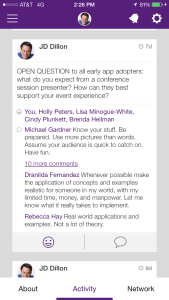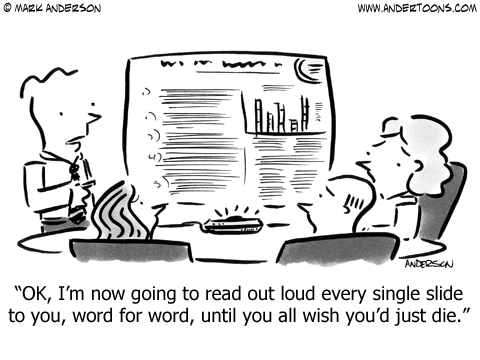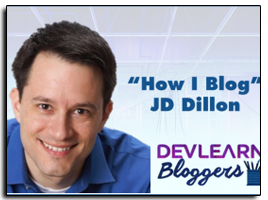I tend to ad lib when I present … A LOT. Yes, I sometimes tangent, but going “off script” helps me customize the presentation for the people in the room. One of my ad libs from a session last year was so well-received that I now include it as part of my standard introduction.
BACK IN 2014 …
Before setting up for my said conference presentation, I had attended a session that was hosted by a vendor. While they didn’t attempt to outright sell their product, every concept they discussed was so intimately tied to their software solution that the session content was pretty much meaningless if you didn’t buy it or have similarly complex resources. Like several other attendees, I walked out. With that in mind, I started my presentation an hour later by saying …
Hi! I’m JD, and I have absolutely nothing to sell you!
I expected some chuckles but not the near standing ovation I received. This initial response and every one since made me think – how big is the disconnect between what conference participants want from a typical session and what speakers are actually delivering nowadays? By no means am I looking to vilify people/organizations who sell L&D things, as I have great respect for their contributions (well … most of them). However, something is obviously amiss.
As I prepare to present 3 sessions (1 morning buzz, 1 learning stage, 1 concurrent) at #DevLearn 2015, I’ve decided to quickly explore what I believe SHOULD be the evolving role of the conference speaker …
From the DevLearn crowd …
 For some quick and timely crowdsourcing, I turned to the DevLearn event app and posted this on the activity feed last week:
For some quick and timely crowdsourcing, I turned to the DevLearn event app and posted this on the activity feed last week:
OPEN QUESTION to all early app adopters: what do you expect from a conference session presenter? How can they best support your event experience?
Here’s a sample of user replies so far:
- Know your stuff. Be prepared. Use more pictures than words. Assume your audience is quick to catch on. Have fun.
- Go beyond the basics.
- Real world application and examples. I like sessions that are more dialogue.
- I also appreciate the simple lists (like, these are the three things you must remember). Also helpful to have suggested follow-up websites or references for additional info.
- Manage your time, allow for questions, provide real-world examples, make it practical, talk about actual application of concepts.
- Speak to the session description and not wander off topic. Connect the theoretical to the practical. Avoid pitching products and/or services.
- Know your audience.
- Tools for immediate application. Know your audience and understand adult learners bring a skill set.
- Whenever possible make the application of concepts and examples realistic for someone in my world, with my limited time, money, and manpower. Let me know what it really takes to implement.
- Real world applications and examples. Not a lot of theory.
- Would like it to be less product and more solution focused.
I’m not trying to be scientific, as this is obviously a small sample from just one event group. Comments were also visible and therefore may have influenced subsequent answers. However, this feedback aligns with both my own experience as a conference participant as well as discussions I’ve had as a presenter during the past few years. As the underlined themes show, base participant expectations are pretty simple. They want speakers to …
- Provide practical examples they can apply in their work NOW
- Speak with them at THEIR level and not underestimate their knowledge/experience
- Help them connect with additional RESOURCES
I agree completely with my DevLearn peers. But, given that our industry focuses on continued learning and performance improvement along with the effective use of event-driven communication/training, I don’t think those expectations go quite far enough …
Therefore my job is …
You had one job!
There are plenty of opinions around regarding the usefulness of industry conferences. Love them or hate them, many would assert that it’s time for the “3 days crammed with sessions” concept to evolve. Some professional organizations have taken notice and are proactively exploring new ideas while continuing to accommodate both new and experienced event participants. In the meantime, I challenge speakers to accelerate this evolution by enhancing the role they play as an essential part of the event ecosystem.
- Establish credibility … Your session should not be the first time I hear about your expertise/experience with a given topic. I should be able to find you somewhere else and dig into your ideas before showing up in person. It could be a book, past speaking events, recorded presentations, blog posts, or just a vibrant Twitter feed. Your credibility on the topic should be established BEFORE the session begins.
- Engage before, during, AND after … Everyone expects the speaker to engage during the session, but the rubber meets the road in “thought leader” land when you proactively support your audience before AND after the event. Before the conference, use social tools to share your ideas, promote your session, and crowdsource ideas. Then, commit to continue the conversation after the session with everyone who spent time with you – not just those who formed the traditional post-session line and traded business cards. Share ways participants can stay in contact with you (if they so choose) and commit to following through on any post-conference engagement.
- Adjust to the audience … Know who is in the room. Work with event coordinators to better understand the potential audience. Then, before the session begins, talk to people! Find out why they chose your session. Ask about their related challenges. Then, flex your presentation to meet the needs of those who are actually there – not who you thought may attend weeks earlier when you built your content.
- Get practical …. After you quickly get to know who is in the room, determine how much theory is necessary to set the foundation and move quickly to practical examples and stories. Present examples in a way that helps participants lift key ideas that can be directly applied in their work regardless of industry, tools, or organizational makeup. Share plenty of good ideas, but tie them to proven, relatable results.
- Provide OTHER resources … Who inspired your work? Where do you turn for new perspectives? Share those resources with participants so they can expand and tailor their continued learning based on their needs. Look at your conversation as the springboard, not the pool.
- Evolve your delivery capability … Keep working on your presentation and facilitation skills. Try new methods. Explore new support technology. Don’t just settle on “your way” because you always get positive feedback. Speaking of …
- Take action on feedback … Request formal session feedback from the event coordinators. Review the backchannel (Twitter, event app, etc.) related to your session. Curate a collection of feedback, and review it with your PLN. Take action where appropriate so the session becomes a learning experience for you too.
And what I expect from participants is …
Say what?
Oh, this is a two-way street. As participants, we must also evolve the way we engage during events to both support speakers in their efforts and push for continued improvements. After all, if the paying audience wants something new, they’ll get it!
- Share your expectations … Hunt down presenters of interest before the event and ask questions. Clarify their content against your expectations. Help them shape their content based on what you need as a participant.
- Challenge speakers … Don’t just take their word for it, even if they wrote all of the books on the topic. Come to the session with questions. Ask for practical examples. Speak with them after the session to get help applying their ideas to your work.
- Don’t just fawn over big names … When preparing your conference schedule, don’t just follow big speaker and company names. Yes, organizations like Google and Facebook may have amazing content to share – but you should still dig into the session information and speakers. Some of my favorite conference sessions have been led by independent consultants who aren’t even specifically in L&D.
- Engage before, during, AND after … Just as I suggest for speakers, participants should maximize their opportunity by engaging via social tools before and after an event. A quality speaker (except high-demand keynotes of course) will share some form of contact information. Use it to get more than an hour from a knowledgeable resource!
What do you expect from speakers during the conferences you attend? How should the speaker role and overall event concept evolve to improve your professional development opportunities?






